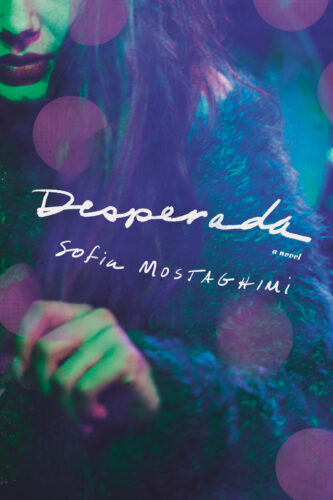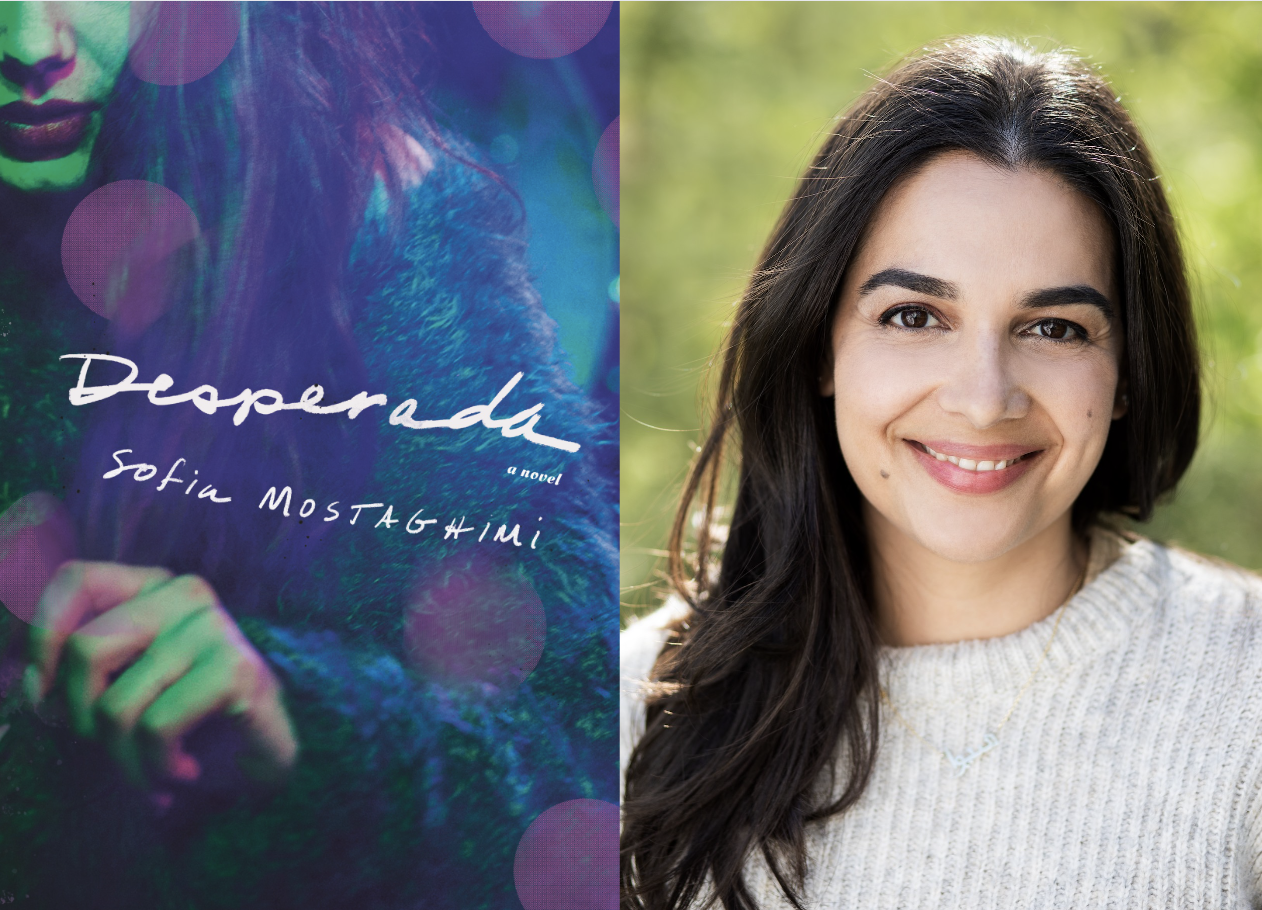Sponsored by Random House Canada
Desperada is Toronto author Sofia Mostaghimi’s stunning debut novel, and we’re in absolute awe of her talents. If you’re seeking a thrilling, gritty, smart page-turner, this is it.
After her sister dies suddenly, a young Iranian-Canadian woman, Kora, quits her job, and seeks escape and transformation in travel, sex and drugs. She moves from Reykjavik to Barcelona, Paris to Berlin, Istanbul to Bangkok. Through her travels, she befriends radical thinkers and a variety of lovers who open her eyes to new possibilities. She quickly learns that fucking men helps kill the pain she feels inside—the sex and orgasms provide Kora with momentary relief from the grief and guilt that weigh her down. Sometimes the sex is wonderfully satisfying, other times messy, awkward, reckless, and scary.
At times Kora’s adventures are arousing, and at other times deeply disturbing. Mostaghimi has given the world an enthralling story that asks readers to consider how we run and hide from pain in our own lives. Author Sharon Bala (The Boat People) sums up Desperada well: “A raw and raunchy debut from a remarkable voice.”
Brilliantly written, Desperada inspires deep soul searching and serious wanderlust. We connected with Mostaghimi to dig deeper.
What compelled you to write Desperada? Where did the idea stem from? What’s the (brief) origin story of your incredible novel?
Back in my late 20s, I knew I couldn’t be young forever, but I was living as if that wasn’t going to be true of me. Probably that’s how most young people are. But then something bad happened suddenly and it reminded me of my own mortality. A year later, Kora’s voice came to me. I spent the next three evenings after work writing for hours bits and pieces of what I thought would be a short story while listening to Rihanna’s song “Desperado” on repeat, and while listening to that song, realized the title Desperada was it.
When it comes to grief, what questions or ideas guided your writing? What did you set out to explore?
I wanted to explore one very basic question: how do we find meaning in a life where there’s death? Another way to put that would be to ask: what’s the best way to live my life when I know that I’m going to die? And not to sound too morbid, haha, but I could push that and even say, not just me, but everyone I’ve ever loved, too? Kora is this character who’s never lived very consciously, as opposed to her late sister, Kimia, who lived a short but full life, and she spends the novel grappling with that fact.
Sex can be healing, and it can also be a form of escapism, a way to numb, like alcohol or drugs. Sometimes it can be both! In your words, what did you set out to say about sex? What were you curious to examine?
I think I wanted to explore the relationship between sex and death, which isn’t new, of course (i.e. the French expression la petite mort) but was something that interested me. Also, sort of going back to what you said in your question, but this idea that sex can be both healing but also incredibly destructive. People, like places, can be used, and Kora, though at times a victim, is also sometimes a real perpetrator of destruction, too. What’s interesting about sex as an outlet and different from, say, alcohol or drugs, is that the act is necessarily tied up with another person, which creates possibilities for connection, but also for real cruelty. I was interested in exploring both those spaces.

This book gave us a lot of wanderlust. What made you decide to set the story in so many locations? We picture you at an airport, looking up at a departure sign, figuring out where Kora should go next… how did you decide where?
To me, as much as this is a story with dark themes like grief and death, it’s also an adventure story, and adventure stories are fun! I always knew she’d travel a lot. I chose places I’d mostly been to, like Paris, Barcelona, Istanbul, and the all-night dance parties of Berlin. Iceland seemed a magical, fitting place for my protagonist to meet a witch. As for Thailand, my husband actually did get roofied at the Full Moon Party in Ko Pha Ngan, which served as inspiration for what happens later in the novel.
You’re a remarkable writer. Can you identify one or two things that really helped you find your voice? Helped hone your craft?
Thank you so much! That’s really kind of you to say. I think it’s probably got to do with reading a lot, and getting a sense of what I like and don’t like, but then also, paradoxically, forgetting everything I’ve ever read, and just writing in a way that feels right and true to me.
What’s some writing advice that has served you well?
Don’t pull the rug from underneath your characters too soon — play out the scene! Always consider the possibility that something else might work better (which is probably why I wrote 7 or 8 versions of the “Iceland” section — ha!). Also, the pain is part of the process.
Keen to know how writers write, can you paint us a picture of what writing Desperada looked like?
Pure chaos, actually! I did write the first draft in relative peace and quiet. It was a very bad draft, then the pandemic hit. Which would have been fine except that my house caught fire (I was also three months pregnant at the time) and I lived out of various Airbnbs for the next six months or so just maniacally dealing with the insurance company, while also trying to rewrite from scratch my very bad draft before my daughter arrived in the spring. When I look back on that time (and all of the edits I worked on while my daughter was a newborn), it’s no wonder I’m still very, very tired two years later…
What conversations do you hope Desperada inspires?
A novel inspiring any conversation between its readers is a writer’s dream! Much like Kora does throughout the book, I’ll leave it up to the reader to draw meaning where they can find it.
Desperada is available now in paperback, ebook, or as an audiobook. Get your copy today at penguinrandomhouse.ca, or at all good retailers.



 Follow Us On Instagram
Follow Us On Instagram
